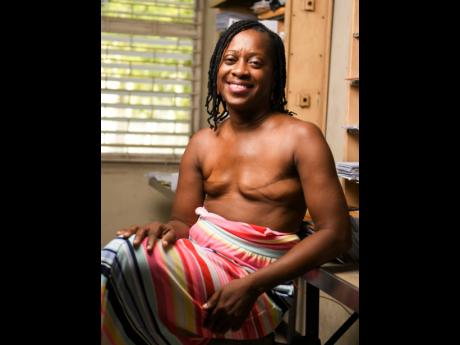Garth A. Rattray | Don’t ignore breast cancer
Many years ago, a family friend asked me to do a home visit on a friend of his. She was losing weight rapidly and acting strangely. I arrived at the gate and was ushered in.
As soon as I got to the verandah, a horrible smell wafted by. The closer that I got to the lady, the worse it became. During our initial chit-chat, I noticed that she had thick clothing on her chest. When we got to the examination, there was a huge, fungating lesion on her left breast. The bloody mass reeked to high heavens.
It turns out that she had noticed a breast lump for over a year but was so scared of the prospect of breast cancer that she ignored it and kept it a secret. The family noticed her hermit-like change in behaviour, appetite and weight loss, along with a curious odour emanating from her room.
Her terror paralysed her into inaction and, needless to say, she was beyond any help and died a few days after I saw her. As far as diseases go, we can’t afford to ignore them, because they won’t ignore us.
Breast cancer remains the number one cancer on the planet. A diagnosis of breast cancer is chilling and inspires unspeakable fear. However, the absolutely worst thing to do is to ignore it or chose unproven treatment strategies. At 23 per cent of all cancers in women, it’s among the leading cause of cancer death in postmenopausal women. This figure can be reduced if women were vigilant about breast self-examination, had clinical examinations, took advantage of breast imaging, and, if diagnosed, adhere to treatment protocols.
EARLY DETECTION
We can prevent colon cancer and cancer of the uterine cervix, but (so far) we can’t prevent breast cancer. However, we can detect it very early. Because breast cancer is so prevalent, intense research has gone into detecting and treating it, and the long-term survival numbers are rising.
There are several types of breast cancer: non-invasive breast cancer, like lobular carcinoma in situ and ductal carcinoma in situ. There are also invasive breast cancers, like infiltrating lobular carcinoma, infiltrating ductal carcinoma, medullary carcinoma, mucinous carcinoma, tubular carcinoma, inflammatory breast cancer, Paget’s disease of the breast, Phyllodes tumour and triple-negative breast cancer.
Aside from regular breast self-examination and visiting a doctor or screening facility like the Jamaica Cancer Society, ‘history’ is very important in breast cancer. A personal history and family history are significant diagnostic and predictive tools. A first-degree relative (mother, sister or daughter) with a history of breast or ovarian cancer is very important to know. Clinical examination of breasts and relevant proximal areas are also important. Access to risk-assessment gene testing is available in Jamaica.
Some screening and investigative procedures include the mammogram, perhaps combined with an ultrasound. There’s also digital mammography and, perhaps, MRI of the breasts. If further investigations are needed, there is the CT scan, bone scan, PET scan, and oestrogen and progesterone receptor tests. Tumour markers in breast cancer seem to be iffy. Various biopsies can be performed – varieties of surgical biopsy, a core biopsy, or the fine needle aspiration biopsy.
The goal of treatment is to “preserve quality of life with prolonged life expectancy”. Doctor-patient communication, psychological preparation, and, perhaps, counselling are essential.
Treatment modalities depend on the type of breast cancer, tumour aggression, and staging. They include lumpectomy, partial mastectomy, unilateral or bilateral mastectomy, and reconstructive breast surgery. Other treatments include radiotherapy, a variety of chemotherapy regimens, and anti-oestrogen therapy. If patients decide on alternative medicine, it’s wise to also adhere to traditional therapies and to inform their doctor about what they are taking.
Don’t ignore breast cancer. For your best chance at survival, fight it!
Garth A. Rattray is a medical doctor with a family practice. Email feedback to columns@gleanerjm.com and garthrattray@gmail.com.


